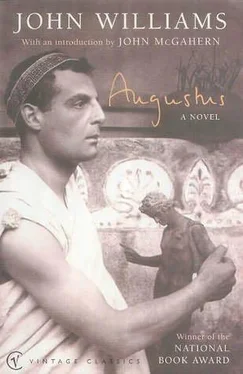John Williams - Augustus
Здесь есть возможность читать онлайн «John Williams - Augustus» весь текст электронной книги совершенно бесплатно (целиком полную версию без сокращений). В некоторых случаях можно слушать аудио, скачать через торрент в формате fb2 и присутствует краткое содержание. Жанр: Историческая проза, на английском языке. Описание произведения, (предисловие) а так же отзывы посетителей доступны на портале библиотеки ЛибКат.
- Название:Augustus
- Автор:
- Жанр:
- Год:неизвестен
- ISBN:нет данных
- Рейтинг книги:3 / 5. Голосов: 1
-
Избранное:Добавить в избранное
- Отзывы:
-
Ваша оценка:
- 60
- 1
- 2
- 3
- 4
- 5
Augustus: краткое содержание, описание и аннотация
Предлагаем к чтению аннотацию, описание, краткое содержание или предисловие (зависит от того, что написал сам автор книги «Augustus»). Если вы не нашли необходимую информацию о книге — напишите в комментариях, мы постараемся отыскать её.
Augustus — читать онлайн бесплатно полную книгу (весь текст) целиком
Ниже представлен текст книги, разбитый по страницам. Система сохранения места последней прочитанной страницы, позволяет с удобством читать онлайн бесплатно книгу «Augustus», без необходимости каждый раз заново искать на чём Вы остановились. Поставьте закладку, и сможете в любой момент перейти на страницу, на которой закончили чтение.
Интервал:
Закладка:
How do you oppose a foe who is wholly irrational and unpredictable-and yet who, out of animal energy and the accident of circumstance, has attained a most frightening power? (Looking back on it, it is odd to remember that at once we construed Antonius to be our foe rather than the Senate, though our most obvious enemies were there; I suppose instinctively we felt that if such a bungler as Antonius could manage them, we should not have that much trouble with him either, when the time came.) I do not know how you oppose him; I only know what we did. Let me tell you ofthat.
We had seen Antonius and had been brusquely dismissed by him. He was the most powerful personage in Rome; we had nothing except a name. We determined that our first necessity was to get recognition from him. We had not been able to get that by overtures of friendship; thus we had to try the overtures of enmity.
First, we talked-among Antonius's enemies and among his friends. Or, rather, we questioned, innocently, as if we were trying to understand the events of the day. When did they suppose Antonius would give attention to Caesar's will? Where were the tyrannicides-Brutus, Cassius, the others? Had Antonius gone over to the Republicans, or was he still faithful to Caesar's Party of the People? That sort ofthing. And we were careful to insure that reports of these conversations got back to Antonius.
At first there was no response from "him. We persisted. And then at last we heard descriptions of his annoyance; retellings of insults he gave to Octavius began making the rounds; rumors and accusations against Octavius passed from lip to lip. And then we made the move that had to bring him into the open.
Octavius had, with some small assistance from me, composed a speech (I may have a copy of it somewhere among my papers; if my secretary can discover it, I will send it on to you), in which he sorrowfully announced to the people that despite the will, Antonius would not release Caesar's fortune to him, but that he (Octavius), having taken Caesar's name, would fulfill Caesar's obligations-that the bequest would be paid them out of his own pocket. The speech was made. There was nothing really inflammatory in it; the tone was one of sorrow, regret, and innocent bewilderment.
But Antonius acted precipitately, as we had hoped he would. He at once introduced legislation into the Senate which would prevent the legal adoption of Octavius; he allied himself with Dolabella, who at that time was co-consul with him and who had been close to the conspirators; he enlisted the support of Marcus Aemilius Lepidus, who immediately after the assassination had fled Rome and gone to his legion in Gaul; and he made open threats against Octavius's life.
Now you must understand that the position of many of the soldiers and citizens was extremely difficult-or at least so it seemed to them. The rich and powerful were almost without exception against Julius Caesar, and thus against Octavius; the soldiers and the middle citizenry almost without exception loved Julius Caesar, and hence favored Octavius; yet they knew that Marcus Antonius had been Caesar's friend. And now they were witnessing what they took to be a destructive battle between the only two persons who might take their part against the rich and aristocratic.
Thus it happened that Agrippa, who better than any of us knew the soldiers’ life and language and habits of thought, went among those minor officers and centurions and common soldiers whom we knew to be veterans of the campaigns and friends to Caesar, and supplicated them to use their offices and common loyalty to quiet the dispute that had grown needlessly between Marcus Antonius and Octavius (whom he called Caesar to them). Assured of Octavius's love and convinced that Antonius could not look upon their efforts as rebellion or disloyalty, they acted.
They were persuaded (there were several hundred of them, I believe) to march first to Octavius's house on the hill. It was important that they go there first, you will understand. Octavius pretended surprise, listened to their pleas for friendship with Antonius, and made a brief speech to them in which he forgave Antonius the insults and agreed to repair the breach that had grown between them. You may be certain that we made sure Antonius was informed of this deputation; if they had marched upon his house without warning, he might easily have mistaken their intention and thought they were led against him in retaliation for his threats upon Octavius's life.
But he knew of their coming; and I have often tried to imagine his anger as he awaited them alone in that huge mansion where Pompeius once lived and that Antonius had appropriated after Caesar's murder. For Antonius knew that he had no choice but to wait, and he might have had an intimation then of the course his life was to run.
At Agrippa's prompting, the veterans insisted that Octavius come with them-which he did, though he would not walk in a position of honor, but was escorted at the rear of the line of march. I must say that Antonius behaved reasonably well when we marched into his courtyard. One of the veterans hailed him, he came out and saluted them, and listened to the speech that had already been given to Octavius-though he was a little curt and sullen when he agreed to the conciliation. Then Octavius was brought forward; he greeted Antonius, the salutation was returned, and the veterans cheered. We did not linger; but I was standing very near the two of them when they came together, and I shall always believe that there was a small, grudging, but appreciative smile on Antonius's face when they clasped hands.
That, then, was the first small power we had. And it was that upon which we built.
I tire, my dear Livy. I shall write again soon, when my health permits it. For there is more that may be said.
Postscript: I trust that you will be discreet in the use of what I tell you.
X. Letter: Marcus Tullius Cicero to Marcus Junius Brutus (September, 44 B. c.)
The events of the past few months have put me in despair. Octavius quarrels with Antonius; I have hope. Their differences are reconciled, they are seen together; I am fearful. They quarrel again, rumors of plots are in the air; I am puzzled. Once again they mend their disputes; and I am without joy. What does it all mean? Does either of them know where he is going? Meanwhile, their disputes and reconciliations keep all of Rome in a turmoil, and keep the assassination of the tyrant alive in the minds of everyone; and through it all, Octavius's strength and popularity steadily increase. I sometimes almost believe that we may have misjudged the boy-and then I am persuaded that it is the accident of event which makes him appear more capable than he is. I do not know. It is too dark.
I have found it necessary to speak against Antonius in the Senate, though it may have put me in some danger. Octavius gives me his support in private conversation, but he does not speak in public. In any event, Antonius now knows that I am his implacable enemy. He threatened such harm that I dared not give my second address to the Senate; but it will be published, and the world will know it.
XI. Letter: Marcus Tullius Cicero to Marcus Junius Brutus (October, 44 B.C.)
Recklessness, recklessness! Antonius has mobilized the Macedonian legions and goes to meet them at Brindisi; Octavius is enlisting the discharged veterans of Caesar's legions in Campania. Antonius intends to march to Gaul against our friend Decimus, ostensibly to avenge the assassination but in fact to augment his power by gaining the Gallic legions. It is rumored that he will march through Rome, showing his strength against Octavius. Shall we have war again in Italy? Can we trust so young a boy and with such a name as Caesar (as he calls himself) with our cause? Oh, Brutus! Where are you now, when Rome has need of you?
Читать дальшеИнтервал:
Закладка:
Похожие книги на «Augustus»
Представляем Вашему вниманию похожие книги на «Augustus» списком для выбора. Мы отобрали схожую по названию и смыслу литературу в надежде предоставить читателям больше вариантов отыскать новые, интересные, ещё непрочитанные произведения.
Обсуждение, отзывы о книге «Augustus» и просто собственные мнения читателей. Оставьте ваши комментарии, напишите, что Вы думаете о произведении, его смысле или главных героях. Укажите что конкретно понравилось, а что нет, и почему Вы так считаете.











